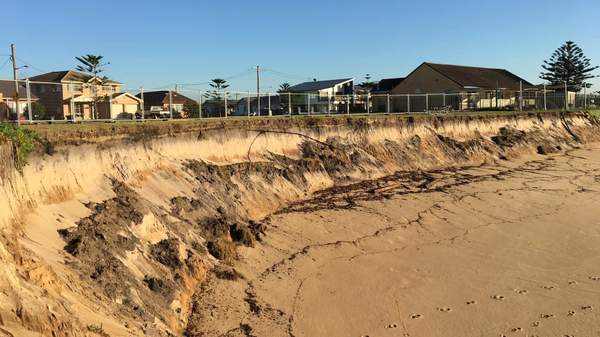Overview
As a country girt by sea, it's easy to take Australia's sandy waterside for granted. But just like our ever-rising temperatures, ever-lingering drought conditions and increasingly widespread bushfires, our coastline isn't immune to climate change. Nor, with oceans both warming and rising, are our beaches guaranteed to withstand it.
In Stockton Beach, in Newcastle's north on the NSW coast, this grim reality has been making its presence known for decades, all due to continuing coastal erosion. Since huge storms back in 2015, which cost the beach millions of tonnes of sand, it has been a particularly prominent issue; however, in the past few weeks, the spot has completely lost its coveted patch of sand.
It happened quickly, too — the Newcastle Herald reports that "a section of the beach lost 2.5 metres in sand height" in just five hours. The paper estimates that around 500,000 cubic metres of sand (50,000 truck loads) would be required to replace what's been lost so far.
So instead of somewhere to sit and sunbathe, beachgoers are now met with rocks, sand cliffs and a waterline much closer than it has ever been before. At the south end of the beach, the sand in front of the nearly 112-year-old Stockton Surf Life Saving Club, the adjacent car park and Lexie's Cafe have been particularly hard hit and, unsurprisingly, the City of Newcastle has closed all access points to the beach — except for the one at the Mitchell Street breakwall — until further notice. This aerial footage from The Guardian shows pretty clearly how severely the beach has been affected.
As Newcastle's Lord Mayor explained at a council meeting last week, the catastrophic current situation has been caused by large swells in the recent weeks. The council is now undertaking emergency works, such as sandbagging, in the hope it can get Stockton Beach to condition that's useable for the public. The "preferred option" is to bring sand back in to the beach — an option that relies on the NSW Government's Coastal Zone Management Program. In good news, according to the ABC, the State Government has just approved $250,000 in funding for the council and has declared the beach a Significant Open Coast Location, meaning that the council can apply for emergency funding at any time. Shelley Hancock, the Minister for Local Government, says that the council's applications for funding are "currently undergoing a rapid assessment so that works can be undertaken as a matter of priority".
Fast-tracking a mooted gas terminal at Kooragang Island, which could see sand dredged and relocated to Stockton, has also been floated as a solution — but it would require a statewide ban on offshore dredging to be lifted. Back in June, the council discussed offshore sand extraction, noting that it was "one of the only viable methods for large-scale beach nourishment along the open coast".
At the time of writing, a GoFundMe campaign to save the beach has raised over $18,000, and a the Save Stockton Beach Facebook page is trying to raise awareness around the issue.
Losing a beach is a bleak prospect, but the effects far span beyond just losing somewhere to lay out a towel. As the landscape changes, the sand shifts, threatening nearby buildings. The local daycare centre has been forced to shut due to the erosion, with the structure set to be demolished. Cabins at the nearby holiday park were also vacated last week, as a precautionary measure, although they've since been re-opened.
Coastal erosion is by no means limited to Stockton Beach, of course. Due to rising temperatures and wild weather, sea levels are rising and eating into coastlines around the world, from England to Tunisia. And with similarly bleak scenarios happening across Australia — from Sydney to Melbourne to Perth to Adelaide — stories like these are sadly likely to increase in frequency.
If you live near, or are travelling to, Stockton Beach, check the City of Newcastle website for updates on the beach accessibility. To help, you can get in touch with the Save Stockton Beach group — or keep striking for the government to take action on climate change to prevent this happening to more of our country's epic beaches.
Images: Save Stockton Beach Facebook.
